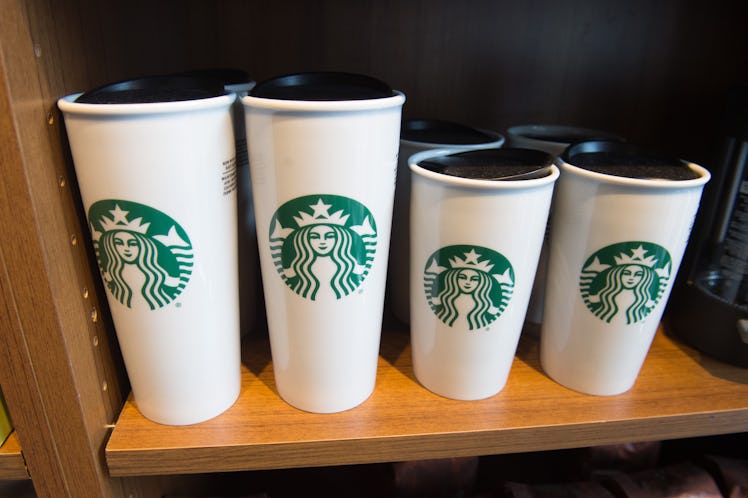
Here's What To Know About Starbucks' Personal Cup Policy Amid The Coronavirus Outbreak
With a growing number of confirmed cases of COVID-19, businesses are taking necessary precautions to help prevent the spread of the virus. Starbucks' personal cup coronavirus policy is one of the preventative measures recently put in place by the retailer. So, what does that mean for customers?
While there are 90,000 confirmed cases of COVID-19 worldwide, according to The New York Times, the World Health Organization (WHO) says coronavirus is not a pandemic yet. Even so, taking steps to try to prevent the spread of the illness is in everyone's best interest. To support that cause, the coffee giant is enacting a few precautionary measures, but the one most likely to affect customers is its new personal cup policy.
In an open letter shared on Wednesday, March 4, Starbucks announced that its stores will no longer fill personal cups with Starbucks beverages when customers bring them in from home. Stores are also suspending the use of reusable "for here" ware during this time, which means drinks will only be available in the disposable cups provided by the chain. Starbucks didn't provide an end date for the precautionary policy.
Even though you won't be able to get your personal cup filled with your Starbucks beverage of choice, you can still get a 10-cent discount when you bring in a reusable cup. The same policy stands for the "for here" ware. Customers will receive a discount when asking for it, but Starbucks cannot serve menu items in it at this time.
Starbucks is also taking guidance from the Centers for Disease Control and Prevention (CDC) and health officials with regard to other precautionary policies. This includes increased sanitizing of machinery and surfaces for all company-operated stores. If, at any time, someone has the virus, affected Starbucks stores are required to report the incident, and they will receive support for temporary store closure if necessary.
While these precautions might sound like a cause for concern, health officials are reassuring the public there's no need for panic, according to The Washington Post. Of course, it's natural to have fear of the unknowns relating to a new illness, but there are simple measures you can take to protect yourself — and they're not dissimilar from precautions you likely take anyway during cold and flu season.
To help minimize your chances of being infected, the CDC recommends washing your hands regularly for at least 20 seconds, covering your nose and mouth with a tissue when you sneeze, staying hydrated, and avoiding the potential spread of germs by keeping your hands away from your eyes, nose, and mouth when possible.
If you think you’re showing symptoms of coronavirus, which include fever, shortness of breath, and cough, call your doctor before going to get tested. If you’re anxious about the virus’s spread in your community, visit the CDC for up-to-date information and resources, or seek out mental health support. You can find all Elite Daily's coverage of coronavirus here.